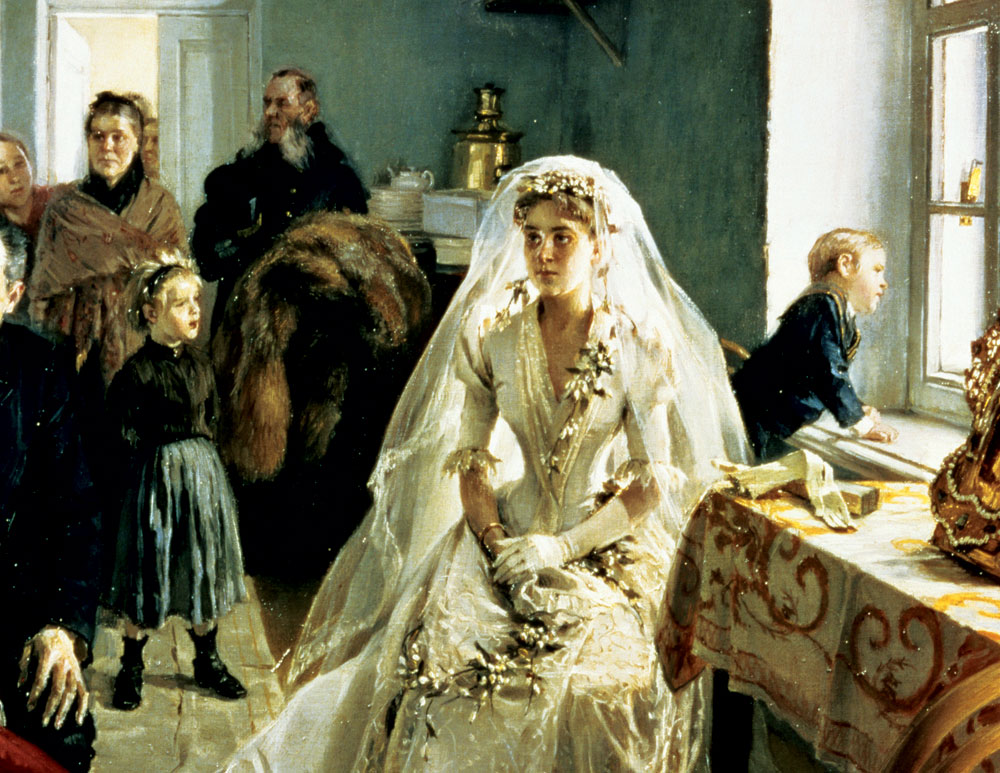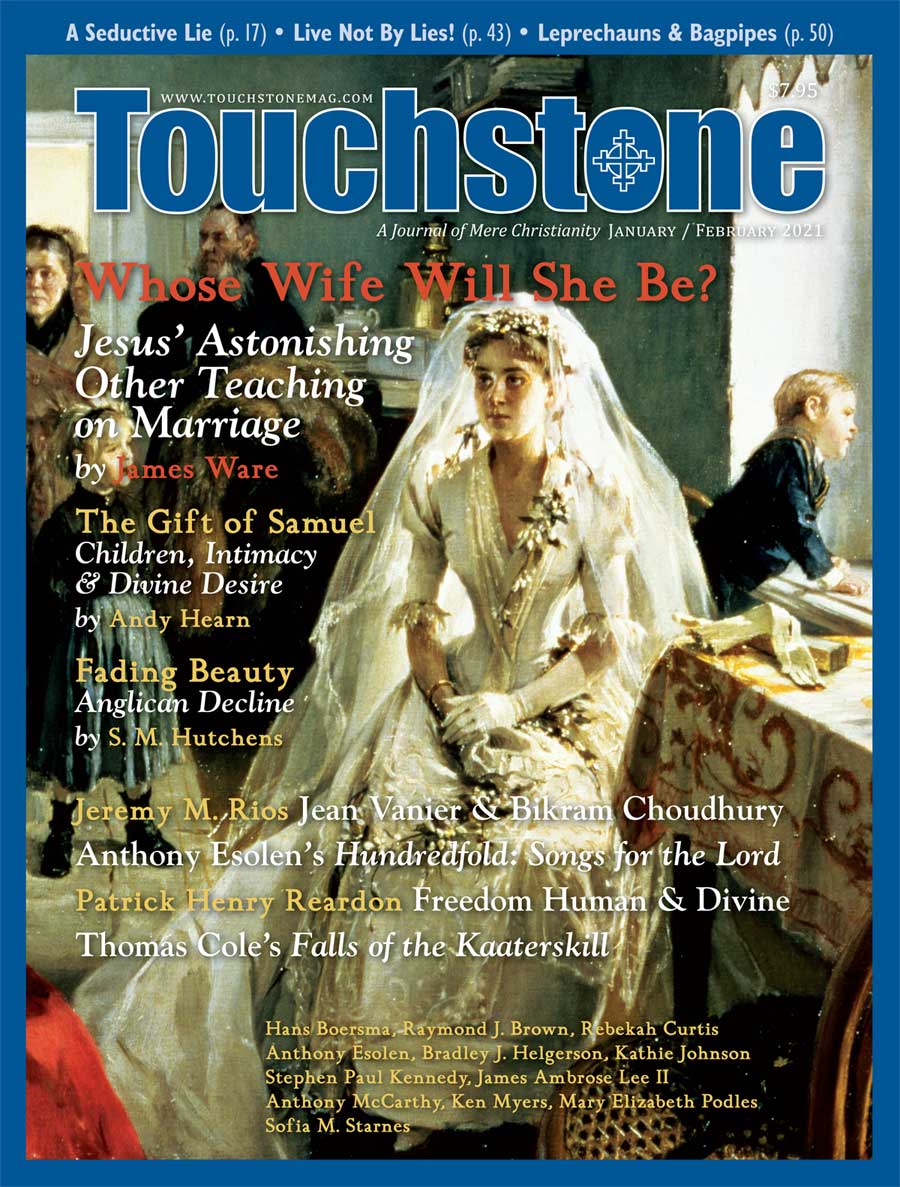Whose Wife Shall She Be?
Jesus' Astonishing Other Teaching on Marriage
Christian catechesis on marriage has traditionally focused—and rightly so—on Jesus' teaching regarding the origin, nature, purpose, and indissolubility of marriage in his encounter with the Pharisees on the question of divorce and remarriage (Matt. 19:1–12; Mark 10:1–12). The Catechism of the Catholic Church, for example, in its two treatments of matrimony (one in Part Two, in the discussion of the sacraments, and the other in Part Three, in the discussion of the sixth commandment), quotes or alludes to one or both of these texts no fewer than twenty times.
However, another occasion of our Lord's instruction on marriage has not received nearly as much attention: Jesus' teaching on matrimony given in his -interaction with the Sadducees on the topic of the resurrection (Matt. 22:23–33; Mark 12:18–27; Luke 20:27–40). The Catechism, in its two lengthy treatments of marriage aforementioned, mentions this teaching but once, and there only to make the point that "marriage is a reality of this present age which is passing away" (1619).
But Jesus' response to the Sadducees sheds light, not only on the status of marriage in the age to come, but on the nature of marriage in this present age. The passage reveals—in some respects uniquely so—the striking continuity of the Church's historic doctrine of matrimony with the mind and teaching of her Lord. In a time when critics on every side seek to call this continuity into question, this other teaching of Jesus on marriage offers important additional light. It is all the more valuable in that the topic at hand is not marriage per se, but resurrection. For the passage thus brings out, in a way unparalleled elsewhere in the Gospels, the underlying foundations and presuppositions of Jesus' teaching on marriage.
Bodily Resurrection Affirmed
Much remains opaque regarding the Sadducees and their teaching. But one thing is crystal clear: although the hope of bodily resurrection and of a renewed world to come was the mainstream and characteristic belief of the ancient Jewish people, it was flatly rejected by the Sadducees. In the synoptic accounts, they come to Jesus with a question designed to deconstruct this resurrection hope as laughable and self-contradictory: if a woman, through the custom of levirate marriage, has had multiple husbands in her lifetime, when the resurrection takes place, whose wife will she be?
This was, we may presume, a stock Sadducean argument against the resurrection, one that found no convincing answer from their chief antagonists on the issue, the Pharisees. But when the Sadducees posed this same question to the itinerant rabbi from Nazareth, they more than met their match. Matthew informs us that Jesus' answer "silenced the Sadducees" (22:34).
Let us focus on the relevant portion of Jesus' response (that is, the portion relating to marriage), as given in Luke's Gospel:
And Jesus said to them, "The people who belong to this age marry and are given in marriage, but those considered worthy to attain that age and the resurrection from the dead do not marry, nor are they given in marriage. For they can neither die any longer, for they are equal to the angels and are sons of God, since they are people of the resurrection." (20:34–36)
Mark and Matthew give a compressed version of Jesus' response: "when they rise from the dead they neither marry nor are given in marriage, but are like the angels who are in the heavens" (Mark 12:25; similarly Matt. 22:30). Some readers, focusing only on Mark's or Matthew's abbreviated account, assume that the risen will be as angels in that they, like the angels, will be spirit beings without physical bodies. But this is a mistaken reading, which utterly fails to grasp the historical context of the dialogue between Jesus and the Sadducees. For in that ancient Jewish context, the very word "resurrection" means the restoration to life of the body of flesh and bones, and its glorious transformation to imperishability.
In affirming the resurrection, therefore, Jesus is not expressing the hope of a disembodied or ethereal afterlife that leaves the body behind. Rather, he is affirming the hope of the ancient Jewish people that, in the time of his kingdom and reign, the God of Israel will conquer death, raising to life the physical bodies of his people from the dust of the earth, and granting them indestructible and everlasting life in a renewed world to come.
Imperishable Like the Angels
In what way, then, will the saints, risen in their glorified bodies, be as angels? Mark and Matthew leave this unstated. But Luke makes the point of comparison clear: the risen saints will be equal to the angels in that "they can neither die any longer" (20:36). Jesus' point, then, to the Sadducees regarding the resurrection and marriage comes into clear focus in Luke's account: because of the nature of the resurrection, those raised to life will be made equal to the angels and sons of God, and therefore they will be imperishable. Marriage, as a result, will cease.
But how does the cessation of marriage follow from the imperishability of the risen saints? Two steps in the logic of Jesus' argument are left unexpressed, and yet are clearly assumed: (1) marriage is ordered to procreation; and (2) the purpose of procreation is the survival of humanity despite human perishability. Therefore, marriage can have no place in the age to come, when the people of God will be imperishable. Jesus' response thus shows up the cavil of the Sadducees as founded on a misconception regarding the resurrection.
In his answer to the Sadducees, Jesus will go on to show how the truth of the resurrection is rooted in the very identity of God, and in his words to Moses at the burning bush: "I am the God of Abraham, the God of Isaac, and the God of Jacob" (Luke 20:37–38). But the astounding sequel to Jesus' debate with the Sadducees (a sequel making this the most richly ironic debate ever recorded) came on the first Easter Sunday, when the one who had stood in their midst, affirming the God of Israel's coming destruction of death, by his own resurrection "abolished death, and brought the light of life and immortality through the gospel" (2 Tim. 1:10).
Five Observations
What is the relevance of this passage for Christian teaching on man, woman, and marriage? Five observations can be made.
1. Realism on Marriage
The first striking element is the realism of our Lord's teaching on matrimony. Jesus describes the purpose of sexual union as procreation, in order to ensure the survival of the human species. Were we to compare Jesus' understanding with the conceptions of the origins and nature of human sexuality in the ancient philosophers, we would see the stark difference. Plato, for example, taught that the existence of two sexes is a declension from humanity's original and intended state, the result of human wickedness. The Epicureans regarded sex as a natural but unnecessary desire, and it is not until the closing lines of the Epicurean philosopher Lucretius's lengthy treatment of the topic that he so much as mentions a connection between the sexual act and human reproduction.
The realism of Jesus' teaching is even more striking when we compare it with the accounts of human sexuality within contemporary queer theory, gender theory, and LGBTQ ideology. Contemporary gender theory denies that there are two sexes, male and female, claims that one's identity as a man or woman has no essential relationship to anatomy and biology, and sees no necessary link between sex and procreation.
In contrast to such fanciful and unscientific conceptions, ancient and contemporary, Jesus' teaching reads almost like an objective description of sexual dimorphism and reproduction in a modern biology text. The concept of human sexuality that we find here is not at variance, but in agreement with biological science. This illuminates why Christian ethical teaching on marriage can operate seamlessly on two levels—divine revelation and natural law. For there is simply no disjunction between them.
2. Sexual Union Is for Marriage Only
A second observation relates to and qualifies the first. For all its scientific and practical lucidity, the passage in Luke reads very differently from a modern scientific text on one point. Whereas the contemporary scientist would normally speak of sex and reproduction, Jesus speaks not of sex but of marriage. This concept, all the more powerful because it is simply assumed, is the same one we see throughout the Bible—the only proper context for sexual union is the covenant of matrimony (Ex. 20:14; Matt. 5:27; 1 Cor. 6:12–20; 1 Thes. 4:3–8; Heb. 13:4).
This is light years away from the thinking of ancient philosophers and sages such as Epicurus, who taught that monogamy is both unnatural and unnecessary, or Plato and Zeno (the founder of Stoicism), with their dreams of promiscuous sex without attachments among the intellectual elite within their ideal city-states. For in Jesus' teaching, the sexual act is the marriage act—not a mere union of bodies, such as Plato, Epicurus, and Zeno envisioned, but a total union of persons, sealed by their free and irrevocable consent to an unconditional, life-long, and indissoluble covenant of total fidelity. This is the beautiful and joyous Christian ethic of matrimony, of which our secular culture's sad sexual ethic of mere "consent" is but a shadow and a parody.
3. Procreation Is a Foundational Good of Marriage
That the procreation, education, and spiritual formation of children is an essential good of matrimony is a crucial element of the Christian ethics of marriage. This concept of matrimony as ordered to family and children has been largely lost (and is often explicitly denied) in our contemporary society. Some would even claim that it is not present in Jesus' teaching. This is of course mistaken, for the procreative dimension of marriage is implicit elsewhere in the Gospels, in Jesus' response to the Pharisees on the question of divorce and remarriage, through his appeal to the creation account in Genesis (Matt. 19:4–6; Mark 10:6–8).
But in Jesus' response to the Sadducees in Luke's Gospel, the procreative purpose of matrimony is not merely implicit, it is the unmistakable foundation of his argument. Apart from this premise, the logic of Jesus' argument would break down. According to the Lord's line of reasoning, marriage exists for a reproductive purpose, and since, following the resurrection, reproduction will cease, marriage will also cease. The procreative purpose of marriage is therefore a clear aspect of Jesus' teaching in this passage.
Christian teaching, of course, does not claim that the procreation and education of children is the sole good of marriage. The marital act has a unitive as well as a procreative dimension. But the Church's historic doctrine does claim that marriage is ordered to procreation, so that the consent of those who validly wed must include openness to the gift of children, who are, in the words of Gaudium et Spes, "the supreme gift of marriage."
This full and familial understanding of marriage reveals why Christians alone (and not the secular world) are equipped to fully understand and minister to the depth of the pain felt by infertile couples. And it is this family-focused understanding of marriage that explains why the Church has always so warmly embraced and encouraged adoption, with a wild and almost fanatical enthusiasm that the secular mind cannot fully comprehend.
All of these are fruits of the Church's moral teaching (in our day so radical and countercultural) that marriage is ordered to children. The marked coherence of this teaching and precept of the Church with the Lord's teaching in the Lucan passage is striking. According to Jesus, the procreative dimension is a primary and essential end of marriage, such that, apart from its procreative end or purpose, marriage will no longer exist. This passage is unique in the Gospels in the power of its witness to this aspect of the teaching of Christ on marriage.
4. Marriage Is a Male-Female Union
Jesus' understanding of marriage as ordered to procreation clearly involves another assumption: that marriage is the union of a man and a woman. The claim is endlessly repeated today that Jesus, in his teaching of love and acceptance, did not define marriage as a male-female union nor preclude same-sex unions. For example, Fr. James Martin, a Roman Catholic priest who acknowledges that the Bible defines marriage as the union of man and woman but calls into question the contemporary applicability of this teaching, seeks to bolster his case with the claim that "Jesus says nothing about the topic." This claim is clearly falsified by Jesus' words to the Pharisees in Matthew's Gospel on the nature of marriage: "Have you never read that the Creator from the beginning made them male and female?" (Matt. 19:4, italics mine).
However, Jesus' response to the Sadducees in the Lucan passage we are considering is not always taken into consideration as a further witness to Jesus' teaching on this score. It should be. In affirming that procreation is an essential dimension of marriage, Jesus here clearly understands matrimony as founded on sexual complementarity, the union of male and female. He thus defines marriage as the union of a man and a woman, ordered to the procreation and upbringing of children. And we have already seen that Jesus considers marriage the only appropriate context for sexual intimacy. Our Lord's teaching in this passage thus clearly prohibits same-sex unions, as well as every other form of sexual intimacy outside the unique covenant of marriage.
5. The Sexual Binary Is Permanent
One final observation can be made. The words rendered above as "marry" and "are given in marriage" reflect two distinct Greek verbs. When used in tandem, as in the Lucan passage, these verbs are, in ancient Greek usage, always sex-specific. Thus, when Jesus declares that in the age to come those who have attained to the resurrection "do not marry" (gamousin), the implicit subject is men, and when he says, "nor are they given in marriage" (gamizontai), the implicit subject is women.
Two important conclusions follow from Jesus' language in this passage. First, we find our Lord here once again clearly defining marriage as the union of male and female. The very words he chooses make it crystal clear that marriage involves the covenantal bond of man and woman. Second, in using these sex-specific expressions, not only for "the people who belong to this age" (Luke 20:34), but also for "those considered worthy to attain that age and the resurrection from the dead" (Luke 20:35), Jesus makes clear that the sexual differentiation between men and women will continue after the resurrection.
This is, of course, the dogmatic teaching of the Church. But this Lucan passage, to my knowledge, is the only place in Scripture where this truth is unmistakably expressed. It reveals not only that the ecclesiastical doctrine is scriptural, but also that it has its origins in the mind of Christ himself.
According to our Lord's teaching here, binary sexual difference—our identity as male and female—is not a temporary, but a permanent feature of our humanity. It is greater than—and independent of—our erotic desires, even those desires rightly ordered to marriage and children. Those desires will be transcended in the fulfillment of all desires in the life of the world to come. Marriage will cease. But manhood and womanhood will endure forever.
According to contemporary LGBTQ ideology, the sexual binary is a mere social construct that oppresses and enslaves. But in Jesus' teaching, that binary is the God-given law of our own nature, which frees us to be human. According to Jesus, there is no other way to be human, neither in this age nor in the age to come, than to be either a man or a woman. To seek to erase this fundamental difference is therefore to collude in our own dehumanization. For our bodily identity as either man or woman is an essential aspect of our human identity as persons made in the image of God.
Worthy of More Attention
In the catechesis and defense of her doctrine of marriage, the Church has rightly concentrated on Jesus' fullest exposition of matrimony, in his dialogue with the Pharisees on divorce. However, I would argue that Jesus' other teaching on marriage, given in his encounter with the Sadducees, warrants more study and attention than it has previously been given. In unique ways, this passage confirms the continuity of the Church's historic doctrine of man, woman, and marriage with the mind and teaching of her Lord.
James Ware is Professor of Religion at the University of Evansville in Evansville, Indiana. His newest book is a guide to Paul's letters for clergy, students, and laypeople, Paul's Theology in Context: Creation, Incarnation, Covenant, and Kingdom (Eerdmans, 2019). He and his wife Jan attend Holy Spirit Catholic Church in Evansville, Indiana.
subscription options
Order
Print/Online Subscription

Get six issues (one year) of Touchstone PLUS full online access including pdf downloads for only $39.95. That's only $3.34 per month!
Order
Online Only
Subscription

Get a one-year full-access subscription to the Touchstone online archives for only $19.95. That's only $1.66 per month!
bulk subscriptions
Order Touchstone subscriptions in bulk and save $10 per sub! Each subscription includes 6 issues of Touchstone plus full online access to touchstonemag.com—including archives, videos, and pdf downloads of recent issues for only $29.95 each! Great for churches or study groups.
Transactions will be processed on a secure server.
more on family from the online archives

31.5—September/October 2018
Errands into the Moral Wilderness
Forms of Christian Family Witness & Renewal by Allan C. Carlson
more from the online archives

24.6—Nov/Dec 2011
Liberty, Conscience & Autonomy
How the Culture War of the Roaring Twenties Set the Stage for Today’s Catholic & Evangelical Alliance by Barry Hankins
calling all readers
Please Donate
"There are magazines worth reading but few worth saving . . . Touchstone is just such a magazine."
—Alice von Hildebrand
"Here we do not concede one square millimeter of territory to falsehood, folly, contemporary sentimentality, or fashion. We speak the truth, and let God be our judge. . . . Touchstone is the one committedly Christian conservative journal."
—Anthony Esolen, Touchstone senior editor











